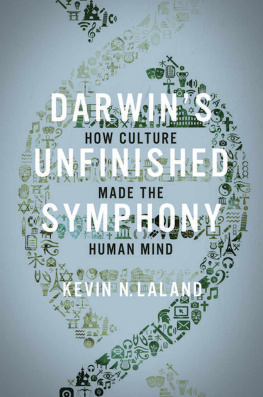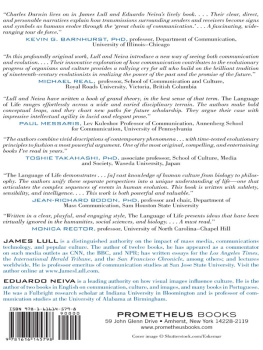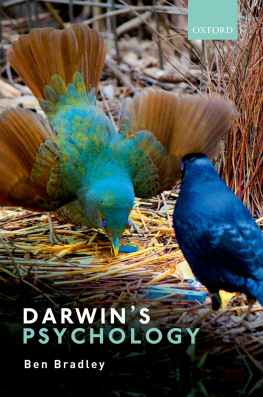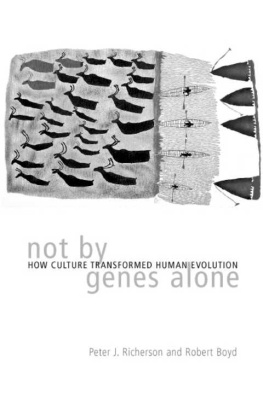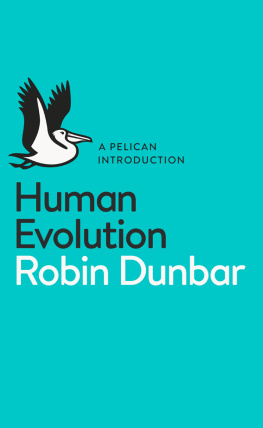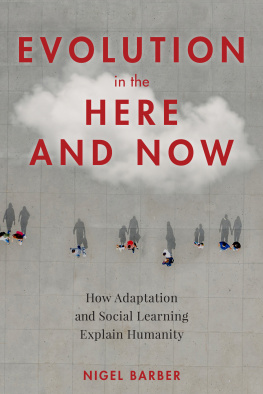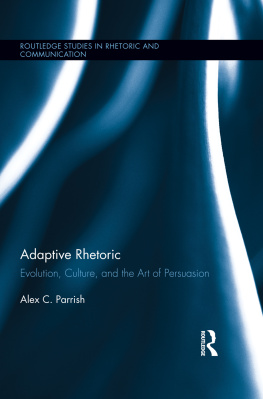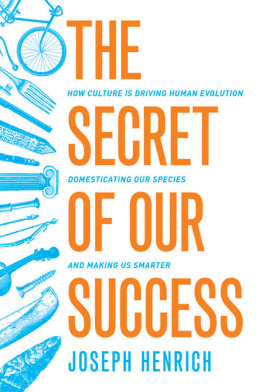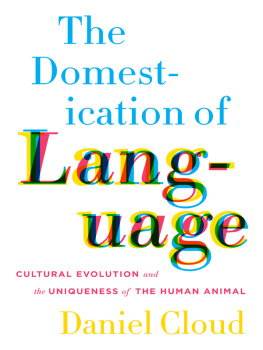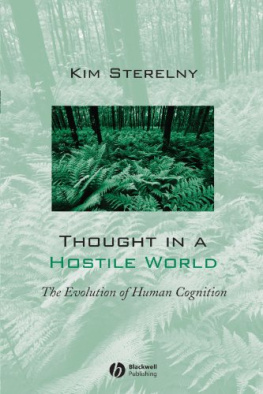DARWINS UNFINISHED SYMPHONY
DARWINS UNFINISHED SYMPHONY
HOW CULTURE MADE THE HUMAN MIND
KEVIN N. LALAND
PRINCETON UNIVERSITY PRESS
Princeton & Oxford
Copyright 2017 by Princeton University Press
Published by Princeton University Press,
41 William Street, Princeton, New Jersey 08540
In the United Kingdom: Princeton University Press,
6 Oxford Street, Woodstock, Oxfordshire OX20 1TR
press.princeton.edu
Jacket design by Michael Boland for thebolanddesignco.com.
Images courtesy of iStock
All Rights Reserved
ISBN 978-0-691-15118-2
Library of Congress Control Number: 2016944396
British Library Cataloging-in-Publication Data is available
This book has been composed in Adobe Text Pro and Trade Gothic LT Std
Printed on acid-free paper.
Printed in the United States of America
10 9 8 7 6 5 4 3 2 1
This book is dedicated to Henry Plotkin,
who started me off on this journey.
CONTENTS
FOREWORD
This book is the product of a collective endeavor. Although I am the sole author, I set out to portray the efforts of a team of researchersthe members of my research laboratory and other collaboratorswho, over a period of 30 years, have shared the scientific challenge of trying to understand the evolution of culture. I hope to provide a compelling scientific account for the evolutionary origins of the human mind, our intelligence, language, and culture; and for our species extraordinary technological and artistic achievements. More than that, however, this book sets out to capture something of the scientific processto lay bare, in an honest way, our struggles, false starts, moments of insight and inspiration, and our triumphs and failures in a scientific journey of discovery. I present our story; that is, I introduce the members of the Laland lab, past and present, and depict our efforts to understand the tremendously exciting puzzle that comprises the evolutionary origins of human culture. I am no novelist and, although this book is written in a style designed to be accessible, it inevitably cannot possess the pace, thrills, or drama of fiction. I hope, nonetheless, that a little something of a detective story comes across, and that the reader experiences a modicum of excitement as they read how our experimental and theoretical findings provided the clues that fueled our investigation.
My first note of thanks must, of course, go to the researchers whose work is described in these pages. I have been privileged to work with some extraordinarily gifted individuals, and have constantly benefitted from the hard work, good ideas, clever experimentation, and ingenious theoretical work of countless undergraduates, Masters students, PhD students and postdoctoral researchers, as well as numerous collaborators both in my own and other institutions. These include Nicola Atton, Patrick Bateson, Neeltje Boogert, Robert Boyd, Culum Brown, Gillian Brown, Hannah Capon, Laura Chouinard-Thuly, Nicky Clayton, Becky Coe, Isabelle Coolen, Alice Cowie, Daniel Cownden, Lucy Crooks, Catharine Cross, Lewis Dean, Magnus Enquist, Kimmo Eriksson, Cara Evans, Marcus Feldman, Laurel Fogarty, Jeff Galef, Stephano Ghirlanda, Paul Hart, Will Hoppitt, Ronan Kearney, Jeremy Kendal, Rachel Kendal, Jochen Kumm, Rob Lachlan, Hannah Lewis, Tim Lillicrap, Tom MacDonald, Anna Markula, Alex Mesoudi, Tom Morgan, Sean Myles, Ana Navarrete, Mike OBrien, John Odling-Smee, Tom Pike, Henry Plotkin, Simon Reader, Luke Rendell, Steven Shapiro, Jonas Sjostrand, Ed Stanley, Sally Street, Pontus Strimling, Will Swaney, Bernard Thierry, Alex Thornton, Ignacio de la Torre, Natalie Uomini, Yfke van Bergen, Jack van Horn, Ashley Ward, Mike Webster, Andrew Whalen, Andrew Whiten, Clive Wilkins, and Kerry Williams. To the extent that we have contributed to a scientific understanding of the topics discussed, this book is their achievement every bit as much as mine.
Many people too have helped with the writing of the book. I would like to thank those who read the entire manuscript, one or more chapters, and/or provided helpful feedback or insights: Rob Boyd, Charlotte Brand, Alexis Breen, Gillian Brown, Nicky Clayton, Michael Corr, Daniel Cownden, Rachel Dale, Lewis Dean, Nathan Emery, Tecumseh Fitch, Ellen Garland, Tim Hubbard, Hilton Japyass, Nicholas Jones, Murillo Pagnotta, Simon Kirby, Claire Laland, Sheina Lew-Levy, Elena Miu, Keelin Murray, Ana Navarrete, John Odling-Smee, James Ounsley, Luke Rendell, Peter Richerson, Christopher Ritter, Christian Rutz, Joseph Stubbersfield, Wataru Toyokawa, Camille Troisi, Stuart Watson, Andrew Whalen, and two anonymous external referees. Through their help, this book has been greatly improved, becoming both more scientifically accurate and more accessible to the general reader. Katherine Meacham also merits a special note of thanks for administrative support in numerous guises, from formatting, to editing notes, to compiling references, all of which were always conducted with extraordinary efficiency and attention to detail.
The idea of my writing this book was first devised as a graduate student at University College London, nearly thirty years ago. I was inspired on reading John Bonners wonderful monograph The Evolution of Culture in Animals (1980, Princeton University Press). I loved the grand sweep and vision of Bonners book, and was enraptured by the sheer scale of the question it addressed. However, an equally inspirational conversation with University of McMaster psychologist Jeff Galef, doyenne of the field of animal social learning, helped me to set Bonners contribution within the broader framework of the field that had Galef led so impressively for decades. With Jeffs help, I was able to recognize that, for all its merits, Bonners book did not provide a thorough explanatory account of how human culture could have evolved from the social learning and tradition observed in other animals. That conversation with Jeff also brought home how a great deal of scientific work would be required before the mysteries underlying the evolution of culture could be unraveled. Bonners visionary conception and Galefs demand for explanatory rigor combined to hatch the idea in my mind that perhaps one day I might rise to this particular challenge.
I would also like to thank Alison Kalett at Princeton University Press for commissioning this book, and pushing me to write it at least ten years before I felt I was ready, and also Betsy Blumenthal, Jenny Wolkowicki and Sheila Dean for help with the production. I am grateful to all at PUP for support, encouragement, and patience throughout a writing process that proved extremely protracted.
Much of this book was written while I was on sabbatical, based in Nicky Claytons laboratory in the Department of Experimental Psychology, at the University of Cambridge in the United Kingdom. I am indebted to Nicky and the members of her Comparative Cognition Laboratory for making me feel at home and providing an environment, both tranquil and stimulating, that was conducive to productive writing. The final chapters of the book particularly benefitted from these exchanges. I am also very grateful to Gillian Brown, Sean Earnshaw, Julia Kunz, Ros Odling-Smee, Susan Perry, Irena Schulz, Caroline Schuppli, and Carel van Schaik for kindly providing images.
I would like to thank the BBSRC, NERC, The Royal Society, EU Framework 6 and 7 programs, Human Frontier Science Programme, European Research Council, and John Templeton Foundation for financial support for my research. I am particularly indebted to Paul Wason, Kevin Arnold and Heather Micklewright at the John Templeton Foundation who have supported my investigations over many years.
Finally, and most of all, I would like to thank my thesis advisor, Henry Plotkin, to whom I owe so much. Henry taught me the ropes of the academic business with unfailing patience, generosity, and enthusiasm. He trained me in how to design experiments, how to think critically, how to balance theory and empirical work, and where attention to detail is important. Our regular, Friday morning discussions were a highlight of my PhD years, and I consider myself hugely privileged to have shared so much of his time.
Next page
